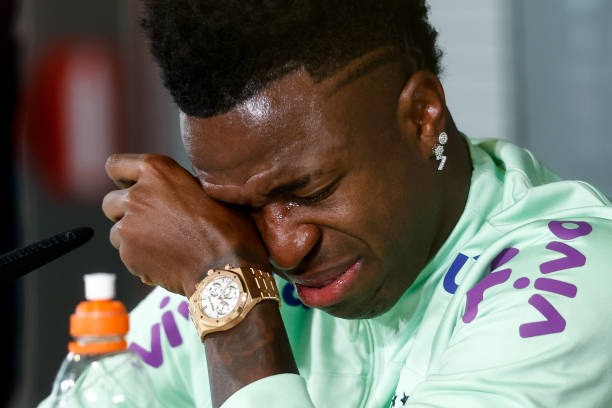Vinícius Júnior, the talented Brazilian forward, has become a victim of racial abuse within the Spanish La Liga stadiums. From the hostile environment of Valencia’s Mestalla stadium to the echoes of bigotry in various other venues, Vinícius’s journey in Spain has been marred by racial slurs and discrimination. But his story is not just about one player facing bigotry; it’s a reflection of a systemic issue ingrained within Spanish football culture.
Racism: A Stain on Spanish Football
Despite the global outcry against racism, Spanish football seems to be struggling to address this malignant tumor within its midst. The incidents at Mestalla and other stadiums underscore a failure on multiple fronts – from the league’s authorities to individual clubs – to combat racism effectively. Vinícius’s case sheds light on the urgent need for tangible action and a collective stance against discrimination in football.
The Blame Game: Player Conduct vs. Systemic Racism
The debate surrounding Vinícius’s abuse is multifaceted. Some argue that his confrontational playing style and verbal exchanges provoke fans, leading to racial insults. However, this simplistic narrative fails to acknowledge the deep-rooted racism pervasive in Spanish society and football culture. It’s not merely about player behavior; it’s about confronting ingrained prejudices that manifest in stadiums across the country.
The Complexity of the Issue: Insights from Carvajal
Dani Carvajal’s recent remarks add another layer to the discourse. While he suggests that fans hurling racist insults might not be inherently racist, his perspective highlights the complexity of addressing racial abuse. Are these outbursts truly just expressions of frustration, or do they reveal deeper societal biases? Carvajal’s stance prompts us to delve deeper into the motivations behind such behavior, challenging us to rethink our approach to combating racism in sports.
A Call to Action: Moving Forward
Vinícius’s ordeal serves as a wake-up call for Spanish football. It’s time for meaningful action, not just words of condemnation. From stringent penalties for offenders to robust educational initiatives, the path forward requires a multifaceted approach. But most importantly, it demands a collective commitment from all stakeholders – players, clubs, authorities, and fans – to foster a culture of inclusivity and respect within football stadiums.
Vinícius Júnior’s battle against racism is emblematic of a larger struggle within Spanish football. It’s a battle that transcends individual players and clubs, requiring a concerted effort to dismantle the systemic barriers to equality. As we confront this issue head-on, let us not forget that the fight against racism is not just about football; it’s about building a more just and equitable society for all




